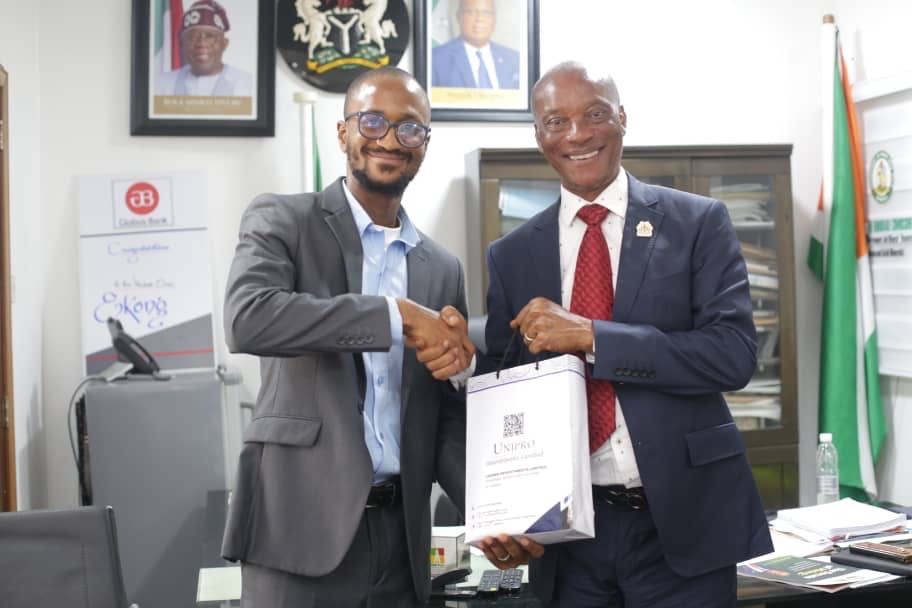Protocol.
To the organizers of Akwa Ibom Tech Week 2025, to our distinguished guests, industry leaders, innovators, entrepreneurs, students, and my brothers and sisters of Akwa Ibom State — I greet you warmly.
Good afternoon.
My name is David Raymond Edet, and I stand here today not only as a business strategist or consultant, but as a son of this land — as someone who has walked the same streets, faced the same uncertainties, shared the same hopes, and believed deeply that Akwa Ibom’s future can be built by Akwa Ibom people.
My topic today is Government-Owned Businesses and Policy Making.
This is bigger than economics.
It is bigger than enterprise.
It is a conversation about identity, destiny, and legacy.
Government-owned businesses are supposed to be vehicles of public good — tools that ensure that no citizen is left behind. They are supposed to create jobs, provide stability, support strategic industries, and make essential services accessible.
But across Nigeria and many African nations, the story has often been different.
Let me give you a number:
Between 2010 and 2022, over 400 government-owned enterprises in Nigeria accumulated more than ₦1.76 trillion in losses.
Not because Nigerians are not smart.
Not because we lack talent.
But because many of these enterprises were not structured to succeed.
Why?
• Leadership chosen for politics, not competence.
• Institutions without continuity.
• Policies written to please individuals, not to serve the people.
This is the hard truth.
But it is not the full truth.
Because right here, in our own State, we have proof that government-owned businesses can work.
THE IBOM AIR EXAMPLE
In 2019, when Ibom Air was launched, many Nigerians laughed. They said: “Government airline? It will fail.”
They said: “Give it two years, it will collapse.”
But today, Ibom Air is recognized as one of the most punctual airlines in Nigeria, one of the most reliable, and one of the fastest-growing regional carriers in West Africa.
Not because we had the most money.
But because the right people were empowered to lead with vision and discipline.
That is policy alignment.
That is what happens when government says:
“We will run business as business, not as patronage.”
If we can do it once, we can do it again and again and again. Across:
• Technology Innovation • Power Infrastructure
• Agriculture
• Local Manufacturing
• Digital Services
• Fintech and Youth Enterprise
The Ibom success story must not be an exception — it must be a blueprint.
WHAT IS THE ROLE OF YOUNG PEOPLE? – one might ask
Let us speak about us — the young minds in this room.
Nigeria today has:
- 65% of its population under the age of 30.
- One of the largest youth-driven tech markets in Africa.
- And projections show that by 2035, Nigeria will have the 3rd largest youth workforce in the world.
But here is the part that matters to us:
Akwa Ibom has one of the highest literacy rates in the South-South region.
We have universities, polytechnics, creative hubs, ICT centers, engineering labs, fintech communities.
We have talent.
We have brilliance.
We have fire.
But too many of our young people feel they must leave home to be seen.
Lagos gets the spotlight.
Abuja gets the investment.
But the minds that will shape Africa may be sitting right here.
And this is why policy matters.
When government policy creates access, access creates opportunity, and opportunity creates innovation.
A STORY FROM AKWA IBOM’S OWN STREETS
Two years ago, I met a young man in Uyo who developed an agric-tech app that helps farmers predict crop yield patterns using rainfall data.
No foreign startup taught him.
No tech hub sponsored him.
He did not school abroad.
He learned from YouTube and community forums.
But he had no accelerator, no grant, no network — and eventually, he left Akwa Ibom for another state where someone simply said:
“We believe in you.”
That story must not keep repeating.
WHAT WE MUST DO — STARTING NOW
1. Government must act as an investor, not just an administrator.
Capital allocation must follow strategic purpose, not political favour.
2. Leadership in government-owned businesses must be based on competence and track record.
We must place builders in positions of responsibility.
3. Create a Youth–Government Development Compact.
A standing framework that:
- Funds startups
- Protects intellectual property
- Provides incubation space
- Guarantees mentorship and partnerships
- Creates government-backed procurement opportunitiesLet me take this opporunity to acknowledge the work done by Pastor Imo-Abasi Jacob, the MD of AKICORP and his team at Ibom LED programme
If a young person in Akwa Ibom builds something useful, government should be their first customer, not their last audience.
THE FUTURE WE ARE BUILDING
Akwa Ibom does not lack creativity.
We do not lack intelligence.
We do not lack ambition.What we need is:
- Platforms
- Access
- Policy alignment
- Inter-generational trustThe next Paystack can rise from Eket.
The next Flutterwave can rise from Ikot Ekpene.
The next Andela can rise from Oron.
The next Dangote Group can rise from Uyo.And when it does, the world will look back and say:
“This place was always capable — they only needed room to rise.”CONCLUSION
Ladies and gentlemen,
Akwa Ibom must not only consume innovation.
We must build it.
We must export it.
We must be known for it.And we will.
Because we are ready. Because we are capable. Because we are Akwa Ibom.
Thank you.
God bless you.
God bless Akwa Ibom State.
And may God bless the dreams we carry.

